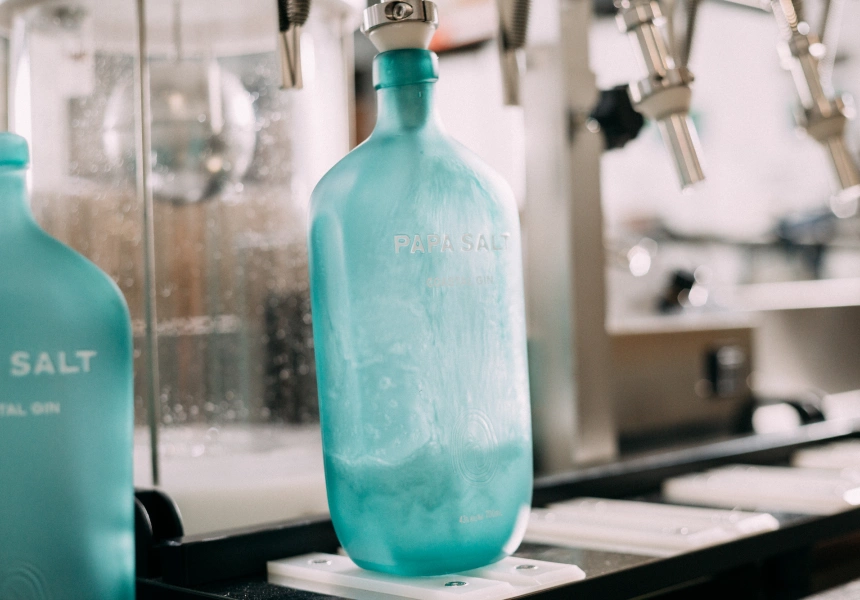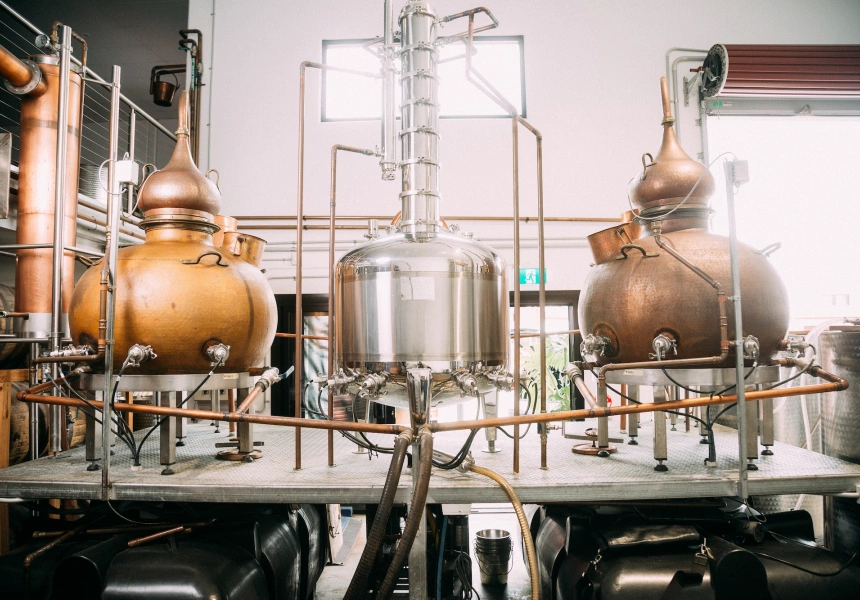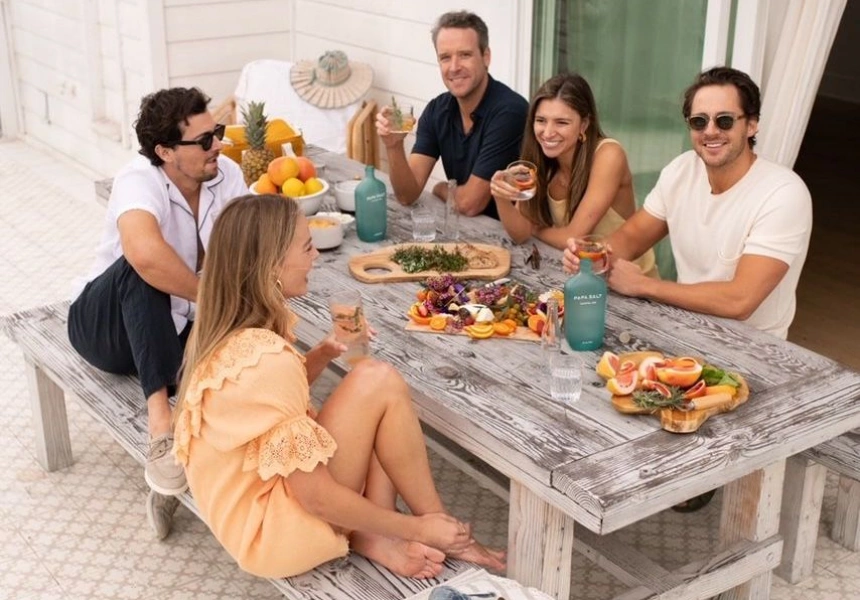It’s just gone 5pm on a Friday in the sunlight-filled backyard of Josey McNamara’s Los Angeles home, where there’s a fierce debate taking place over garnishes. McNamara has blood orange in his glass; Regan Riskas has grapefruit; and Tom Ackerley “is experimenting” with a sprig of lavender and “some pink sprinkly shit”. The group of film producers unanimously agrees, however, on its spirit of choice: Papa Salt, the coastal gin they created together, alongside actor Margot Robbie and director-producer Charlie Maas, through many meetings-turned-hangouts similar to today’s.
The friends turned business partners, who now live within a 10-minute-by-foot radius of each other, first met through the film industry in London (Robbie and Ackerley, and Maas and Riskas, later married). There, during the UK’s typically bleak winters, Robbie took it upon herself to mentally transport the group to the white sand beaches of the Gold Coast, where she grew up, through tropical-themed birthday parties (cocktails and coconut bras in the basement of a London flat) and the like – the illusion spurred on by a horde of friends from home speaking in heavy Australianisms.
“Margot really brought that love of nature, of being in the water, of embracing the active lifestyle to our lives over there,” says Ackerley, a Brit (and now honorary Australian, by way of marriage). “That and a lot of day drinking.”
Never miss a moment. Make sure you're subscribed to our newsletter today.
SUBSCRIBE NOWThe group soon realised they shared a love of gin specifically – something Riskas in particular inherited from her dad, who drank Hendrick’s Gin Martinis on the rocks almost exclusively. After relocating to LA, the land of Margaritas and dirty vodka Martinis, they couldn’t find a gin they liked and so, with direction from Maas’s family, which owns a distillery in Wisconsin, they began playing around with making their own.
There’s an adage about not mixing business and pleasure — let alone a combination of friendships, former flatmates and marriages — but McNamara, Ackerley and Robbie have already proven a friendship-first business strategy is something that can be not only fun but successful too. After meeting on a film set in 2013, the trio moved in together, launching their production company Luckychap Entertainment (which released the ultra-hyped Barbie movie) soon after.
It took five years and 59 different iterations for Papa Salt to become the product it is today: a spirit that captures the taste of a perfectly languid day at the beach through its name, bottle and ingredients – which include Australian oyster shells, to add a slight minerality, and native Australian botanicals, like roasted wattleseed and pink peppercorn, waxflower, hibiscus and citrus peel. “We didn’t ever rush it,” McNamara says. “Because we were doing it for ourselves. We were kind of debating … We weren’t even sure we were going to sell it publicly. We didn’t know. It was just so fun making it.”
Slowing the process down were business meetings that would turn into drinking sessions, kicked off by blind taste-testing sessions where the group would try their formulation against the world’s best gin brands. They wouldn’t stop tweaking the recipe until it at least made the top two – or until the meetings began getting hazy.
“Maybe five or so drinks in, Tom would begin throwing out some really wildcard suggestions,” Riskas says.
Everyone agrees the brand likely wouldn’t have made it past this phase had Maas not put a stop to the experimenting when he entered Papa Salt anonymously into the LA Spirit Awards and it won the gin category. “He was like, ‘We won’t get to keep this award if we change the recipe again!’”, McNamara says.
As I come to find out, the gin tastes great not only in a gin and tonic but also in a Martini, and, most tellingly, in a gin and soda, which is the Papa Salt team’s favourite way to drink their spirit. “It’s quite easy to hide a subpar gin behind the taste of tonic,” Riskas says. “It was really important for us to tick all three of these boxes, as well as [create] something you don’t get sick of after one, because that’s not how our friends drink.”
It was while Robbie was explaining the Australian slang for a beach bum – “salty sea-dog” – that the group stumbled upon a name for the spirit. The example she used was a real-life embodiment of the term that she, Ackerley and McNamara met while travelling: a man, also from the Gold Coast, whose name was Papa Salt. Papa Salt became a place-holder name for the brand, and it stuck.
“It’s untraditional, which fits how this entire thing came together,” says Ackerley.
Papa Salt seeks to bottle the spirit of languid, sunny days on the Australian beach. “One day, if someone’s at a bar in London drinking Papa Salt and thinking for a second, ‘I feel like I could be on a beach in Australia right now,’ that’s what we hope [for],” McNamara says. “That it will evoke that kind of feeling.”
Creating a product that represents beachside Australia by proxy meant Papa Salt needed to leave behind the stiff-upper-lip reputation that gin has in places like the United Kingdom (but no longer in Australia, where, in place of heritage brands, there’s a thriving young craft gin scene). “Even the bottle: we didn’t want it to be this delicate thing that sits on the shelf that no one touches,” Ackerley says. “We wanted it to feel familiar and sturdy in your hand, like you could throw it to a friend across the beach.”
Using Maas’s family distillery in the USA would have been the straightforward route, but, ultimately, the only place Papa Salt could be made was in Australia – landing at Byron Bay distillery Lord Byron.
“Margot always says how overlooked the food and beverage scene in Australia is internationally,” Ackerley says. “As familiar and accessible as Papa Salt is, it’s a premium liquid. It’s beautifully made in a zero-waste, family-run facility in Byron Bay, using native Australian botanicals. So we hope it can be an access point to discovering how incredible the output is there, including when it comes to gin. We’re up against some really great small gin distilleries. The Australian gin drinker is going to be the most discerning, so if it does well there we feel confident taking it anywhere.
“If they like it, we’re set.”
New Zealand stockists
Glengarry
Fine Wine Delivery
Whiskeyandmore.co.nz
Easytiger.co.nz
Liquorland.co.nz



